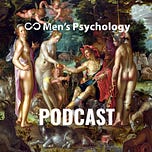Welcome to a series of videos that will introduce you to a simple model of men’s psychology that draws on some of the growing body of research on men.
There’s more than meets the eye with men, just as there is with women. Men are driven at the core by instincts the same as women—masculine instincts.
However, just like women, they have emotions of very similar types and style. The expression is different because emoting is in some part, governed by the instincts.
Finally, the intellect and mature executive functions are also just like those of women (we have identical IQ potential - and “EQ” potential.) Yet the masculine instincts also influence that, and our communication and behavior.
This synthesis of the old and new, the rigorous and the elegant, and most important of all, an attempt at “unification of the psychologies” is the aim of Masculine Psychology, as we start to discuss in this first video.
It’s Masculine Psychology (originally, MMP), which is available in videos delivered one day at a time, for the full 5+ hours of the course (available to paid subscribers only)…
Upgraded Members get full access to the full program and many others from Men’s Psychology right away without waiting for lesson-by-lesson:
SUMMARY:
Dr. Paul revolves around the concept of personal boundaries and their significance in defining one's strength or weakness. Key points include:
1. **Definition of Boundaries**: Boundaries are described as integral to a person's strength, serving as protection and defining one’s personal perimeter. They can be strong, weak, or fall somewhere in between.
2. **Maturity vs. Immaturity**: The speaker emphasizes that strong boundaries reflect maturity, characterized by decisiveness, assertiveness, and wisdom. In contrast, immature behaviors (e.g., being depressive, hostile, or judgmental) weaken boundaries.
3. **Intellectual Growth**: Intellectual maturity comes from being educated, curious, and innovative, while lack of knowledge leads to prejudice and ignorance. The discussion covers various aspects of the psyche, including decision-making, self-esteem, and emotional energy.
4. **Narcissism and Growth**: Behaviors that are destructive tend to be narcissistic, whereas mature behavior fosters constructive growth. The speaker stresses that individuals are always on a spectrum of maturity and should strive to develop mature masculine power.
5. **Mastery and Application**: The importance of mastering one's raw masculine traits through discipline and practice is emphasized. Without this mastery, one risks being undervalued or ignored, much like Nikola Tesla, who failed to leverage his potential within a social and business context, leading to his ideas being credited to others.
6. **From Potential to Action**: The speaker warns against remaining stuck in a state of potential without tangible action. Many individuals may fantasize about their potential instead of working to realize it, and this mindset can hinder personal growth and success.
Overall, the discussion encourages men to understand and strengthen their personal boundaries as a critical aspect of developing maturity and effective masculine identity. The emphasis is on taking actionable steps toward personal mastery and interpersonal effectiveness.













Share this post